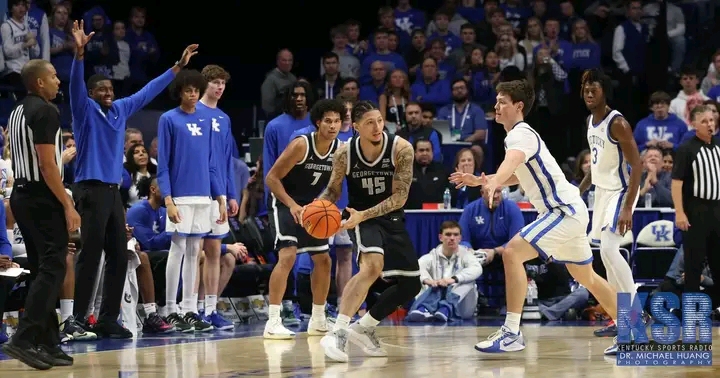It was supposed to be another fine-tuning night before the regular season — but instead, Kentucky’s 84–70 loss to Georgetown turned into a reality check. Inside Rupp Arena, the Wildcats looked out of rhythm, out of sync, and most importantly, without their floor generals.
With both Jaland Lowe and Denzel Aberdeen sidelined, Kentucky’s offense struggled to find an identity. Lowe missed his second straight game with a shoulder injury suffered on October 17, while Aberdeen sat out as a precaution with a minor leg issue. And without either of them, the offense simply didn’t have a true point guard to steady the ship.
Head coach Mark Pope didn’t hide his disappointment afterward. “Really, really disappointing night for me… on this sacred, hallowed court,” he said. “This is a really important night for us to get better. So many teams are going to play us with this exact same game plan.”
No Lowe, No Flow
It became clear early that Pope’s motion-heavy, ball-sharing offense runs through the point guard position — and with Lowe out, there was no one to set the tone. Kentucky committed 15 turnovers, a stark contrast to the nine they had against No. 1 Purdue just a week earlier. The ball stuck too long on one side, and the Wildcats often found themselves forcing contested shots late in the clock.
Otega Oweh did his best to carry the load, scoring a team-high 17 points, attacking the rim with aggression, and drawing fouls to keep Kentucky within reach. He went 8-for-11 from the free-throw line, showing the kind of grit and confidence the rest of the lineup struggled to match.
Behind him, Mouhamed Dioubate added 13 points and seven rebounds, while Collin Chandler chipped in 11 points and seven boards. But without a true ball-handler to organize the offense, Kentucky’s spacing and rhythm never looked right.
Pope’s “read-and-react” system depends on quick decisions and smart passing — both of which suffered in the absence of Lowe and Aberdeen. Braydon Hawthorne and Trent Noah took turns helping in the backcourt, but the leadership and tempo management simply weren’t the same.
The ripple effect of losing your point guards
When you lose both of your primary playmakers, it’s not just about ball-handling — it affects everything. Kentucky’s transition offense slowed, spacing collapsed, and defensive rotations faltered as Georgetown capitalized on live-ball turnovers. The Wildcats were repeatedly beaten off the dribble, and Georgetown controlled the tempo from start to finish.
Every Wildcat who checked into the game finished with a negative plus/minus, a telling stat for a team that prides itself on balance and depth. The Hoyas scored consistently inside, while Kentucky settled for jumpers that wouldn’t fall — especially from beyond the arc, where the Cats went 0-for-13 in the second half.
A lesson before March
Still, Pope viewed the loss as valuable — a “teaching night,” not a disaster. “This is an important night for us to get better,” he said postgame. The film will show more than mistakes; it will reveal what this team truly needs to compete deep into March.
And that answer is clear: a healthy Jaland Lowe.
Lowe’s poise, creativity, and ability to dictate tempo are exactly what this Kentucky team needs. When he’s on the floor, the Wildcats look organized, unselfish, and dangerous. Without him, the offense becomes predictable, and even their elite talent struggles to create cohesion.
The same goes for Denzel Aberdeen, whose energy and defensive pressure complement Lowe perfectly. Once both return, Pope’s system should hum the way it was designed — fast-paced, disciplined, and built around constant movement.
Looking ahead
Yes, the Georgetown loss hurt. But it also handed Kentucky the blueprint for what must change to win when it matters most. The Wildcats have the talent to be special, but to compete in March, they need their point guards healthy and leading from the front.
Because as this game proved, in college basketball, the difference between chaos and chemistry starts with one thing — a true point guard.

